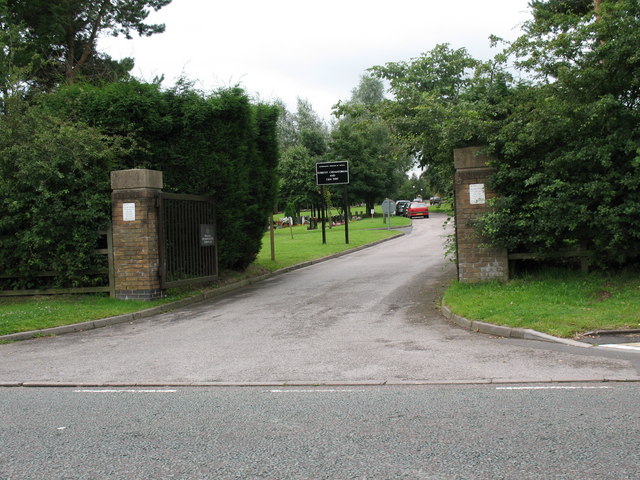
(Photo: Adrian Rothery: Creative Commons)
The sombre and peaceful surrounds of Streetly Cemetary in Walsall might be a somewhat unusual setting for a significant court case, but it was nonetheless the focus of a hearing in the High Court this month. This cemetery is managed according to the ‘lawn principle’, which is based on the Commonwealth War Graves method of laying out burial plots. According to this principle, graves should have a uniform appearance, with rows of consecutive headstones and lawn areas placed in front of each memorial. No fences or barriers are placed between the graves.
Atta Ul-Haq, a local resident, buried his father, Hafiz Khudadad Qadri, at Streetly Cemetery on June 22, 2015, the day after he passed away. Shortly after the burial, Mr Ul-Haq requested permission to erect a small marble edging around his father’s grave in order to prevent people from walking across the grave. Mr Ul-Haq believed that his Islamic faith precluded people from stepping on a grave without a religious reason. Walsall Metropolitan Borough Council, which managed the cemetery, refused Mr Ul-Haq’s request, on the basis that it infringed the ‘lawn principle’ upon which that part of the cemetery was based.
Mr Ul-Haq, therefore, brought a claim in the High Court against the local authority, challenging the lawfulness of their policy and arguing that it constituted a breach of his rights under the European Convention of Human Rights, and in particular, his Article 9 right to Freedom of Religion.
In order to pursue such an argument, Mr Ul-Haq first had to show that he held a sincere belief, based upon his religion, that people should not step onto his father’s grave. Mr Ul-Haq relied upon expert evidence from scholars to demonstrate that this was the case within certain schools of thought.
The Court acknowledged that Mr Ul-Haq held such a view and that it was based upon his religious beliefs. They then moved onto the second question, which was whether the request he had made (which had been refused) was a manifestation of that belief. Although this was not accepted by the local authority, the Court was persuaded that Mr Ul-Haq’s wish to erect marble edging around his father’s grave was a manifestation of his belief that people should not step on the grave.
Thirdly, the Court had to consider whether there had been interference by the local authority with Mr Ul-Haq’s rights under Article 9. Here, the local authority drew attention to the fact that Mr Ul-Haq had chosen to have his father buried at Streetly cemetery notwithstanding the fact that it had operated the ‘lawn principle’ in the Muslim section for more than 20 years. They argued that there were other cemeteries available in the local area and more widely, which could have been chosen instead.
However, the Court noted that this was the only cemetery available to Mr Ul-Haq within the administrative area of this local authority. He had to act quickly after the death of his father, due to the Islamic requirement to bury someone as soon as possible, and the local authority’s forms did not clearly spell out what the rules and regulations were.
Moreover, the cost of using a cemetery in another local authority would have been several thousand pounds more. Therefore, it could not be said that Mr Ul-Haq had exercised a free and informed choice between different cemeteries, and there had therefore been interference by the local authority with Mr Ul-Haq’s Article 9 rights. In addition, the court noted that it was reasonable for Mr Ul-Haq to wish for his father to be buried in the cemetery local to the Muslim Community in which he was such a prominent figure.
However, the final question was whether the local authority could justify that interference. The local authority put forward a number of ‘legitimate aims’ of their policy. They included the protection of the ‘lawn principle’ upon which there had been extensive consultation; this had led to the provision of wooden grave edgings, flush with the ground, for those who seek it, following requests from the Muslim community.
The legitimate aims also included the protection of the loved ones of those who had been buried at this cemetery for many years in the past on the understanding that it would conform to the ‘lawn principle’.
Clearly, they would not be in a position to move the site of their family member’s grave, and there was evidence that complaints had been made when Mr Ul-Haq had attempted to erect a temporary edging to his father’s grave. Finally, the local authority argued that there was a legitimate aim of the protection of health and safety, both of those who walked around the graves and those who maintained it. This was based on the fact that there was usually an ‘access strip’ of around one foot between each grave and one and a half feet at the foot end of the grave space.
However, if an edging were erected it would reduce the access space and would, therefore, limit access for visitors and greatly affect maintenance work. The Court noted that a local authority has a ‘margin of judgment’ in how it meets these legitimate aims and decided that the local authority’s actions, in this case, fell within that margin. Mr Ul-Haq’s claim therefore failed.
This case demonstrates the importance of being aware of the particular policies of the local cemetery if you consider that the manifestation of your religion requires graves to be marked out in a particular way.
Safia Tharoo
Barrister, 42 Bedford Row